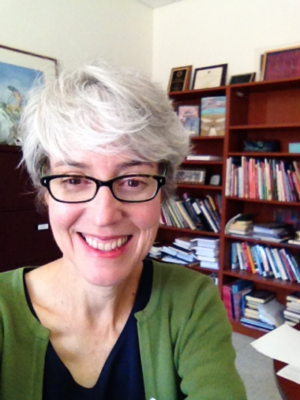This month, CIE’s Institute of World Affairs is honored to feature a testimonial from Julie Kline, Associate Director and Distinguished Administrative Program Specialist of UWM’s Center for Latin American and Caribbean Studies (CLACS).

Julie has dedicated over thirty years to expanding global learning opportunities at UWM and the community. Her work has primarily involved administration and public engagement about Latin America and the Caribbean, including K-16 educator professional development opportunities. Organizing workshops and other opportunities for teachers has been one of the absolute favorite aspects of her job
Julie has also worked extensively with the Department of Education’s National Resource Center Title VI grant program. Like CIE, CLACS has received federal funding which is now under Title VI of the Higher Education Act. In 1973, it formed a Title VI consortium in partnership with what is now the UW-Madison Latin American, Caribbean and Iberian Studies Program (LACIS). In 2000 the Center’s name was changed to the Center for Latin American and Caribbean Studies to better reflect the scope of faculty research and teaching expertise. In 2015 CLACS celebrated 50 years of continuous National Resource Center funding. To learn more about the history of CLACS, click here.
If you ask her what she is most proud of from over thirty years working at CLACS, the answer likely will be helping initiate the Américas Award for Children’s and Young Adult Literature in the early 1990s, sponsored by the national Consortium of Latin American Studies Programs (CLASP). She then served as coordinator of the Award between 1993 and 2011.
In addition to being recognized as a Distinguished academic staff member (2014), her work has also been recognized with the Academic Staff Outstanding Performance and Service Award (2013) and the University of Wisconsin System Regents Award for Excellence (2001).
Julie will be retiring in this summer. We would like to congratulate her on her retirement and sincerely thank her for her support and partnership with IWA over the years!
Q. You have over thirty years of experience in public engagement, especially in organizing professional development workshops for educators and campus and public programs. How do you think outreach has evolved over the years?
Julie: I can speak to how our own outreach has evolved. We’ve expanded our reach by offering programs and resources that engage wider audiences. Our work with children’s literature, for example, has allowed us to connect with elementary school educators, as well as school and public librarians. Diverse collaborations and delivery methods have helped us expand access to many of our offerings. I would say we have also tried to draw from unique speakers and areas of expertise (such as journalists, public health professionals, activists, and other practitioners) and to hear even more voices and perspectives from Latin America and the Caribbean.
Q. What are some of your collaborations with IWA in your role as the associate director at UWM CLACS?
Julie: As the two federally funded National Resource Centers at UWM, we have a shared internationalizing education mission. We’ve collaborated on teacher and student programs for many years and currently on a MPS book fellows program, bringing selected teachers and librarians to spend a week in UWM Libraries, using specialized book collections, including the newest: the International Children’s and Young Adult Literature collection, which highlights experiences outside the U.S
Q. Why do you think IWA is an important resource to UWM and the community?
Julie: UWM considers community engagement as one of its defining features. IWA has creatively sought diverse community collaborations in its internationalizing education efforts. It has built a community of educators and classrooms that witnesses IWA’s commitment, dedication, and investment in bringing global experiences to connect with local issues.
Q. Could you elaborate on the significance of the NRC Title VI grant program to UWM? How does it contribute to the university’s mission and goals?
Julie: Title VI funding means a university is recognized on a national scale as doing meaningful work to internationalize both its campus and its community (locally, regionally, and nationally). The funding is highly competitive (as shown if you filter for NRCs on the U.S. Dept of Education’s google map of funded programs). It’s quite remarkable that UW-Milwaukee has two funded NRCs.
Q. Given your extensive experience in international outreach work, what do you think is different in the IWA approach to global outreach? In other words, what do you think is IWA’s unique role?
Julie: I consider IWA outreach to be true to what it says on your website: “The expertise gained through each person’s lived experience has value. We believe that recognizing our shared humanity is the key to gaining a truly global perspective.” Given that Title VI NRCs are university-based, there has traditionally been a tendency to equate expertise with scholarship, not lived experience. By bringing global individuals with stories and experiences to share, connections are made, understanding grows, and action often follows.
Q. From your perspective, what does it mean to be a global citizen?
Julie: I think it means being curious and ever ready to engage with people, ideas, and perspectives beyond the borders you know.